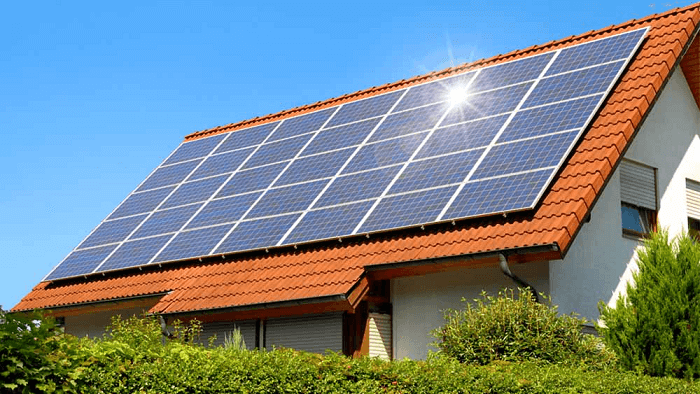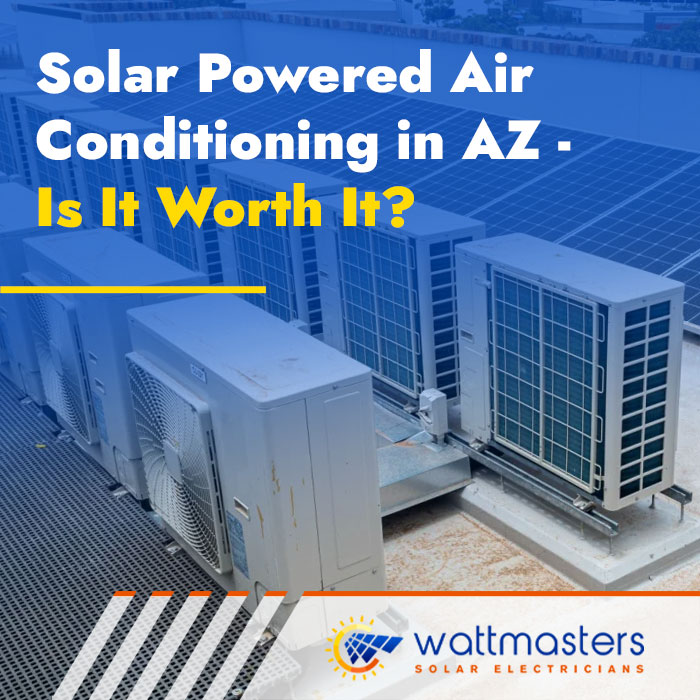A Guide to Solar-Powered Air Conditioning in Arizona: Is It Worth It?
Solar power has gained immense popularity in recent years as a sustainable and eco-friendly alternative to traditional energy sources. Harnessing the power of the sun, solar panels are capable of generating electricity, which can be used to power various appliances and systems in our homes. One such system that has seen advancements in full solar panel system technology is air conditioning. Let’s see the concept of solar-powered air conditioning and discuss whether it is worth considering for your cooling needs.
How Solar-Powered Air Conditioning Works
Solar-powered air conditioning systems utilize solar energy to cool indoor spaces. These systems consist of solar panels, an inverter, ac air conditioners, and an air conditioning unit. The solar panels convert sunlight into direct current (DC) electricity, which is then converted into alternating current (AC) electricity by the inverter and solar air conditioner. The AC electricity powers the air conditioning unit, allowing it to operate efficiently.

Benefits of Solar-Powered Air Conditioning in Arizona
1. Reduced Energy Costs
Any Arizona home or business owner will tell you, air conditioning bills in the summertime are the greatest expense! One of the primary benefits of solar-powered air conditioning is its ability to reduce energy costs. By generating electricity from the sun, home and business owners can significantly reduce their reliance on the grid, resulting in lower energy bills.
2. Environmental Friendliness
Solar-powered air conditioning from solar pv systems is an environmentally friendly option as it utilizes renewable energy. By reducing dependence on fossil fuels, these solar pv air can systems contribute to the reduction of greenhouse gas emissions and help combat climate change.
3. Energy Independence
Solar-powered air conditioning systems provide homeowners with energy independence. They are not reliant on the power grid, which is particularly beneficial during power outages or in remote areas with limited access to electricity grid power itself.
4. Long-Term Savings
Although the initial installation cost of solar powered air conditioners may be higher compared to traditional systems, it offers long-term savings. Over time, the savings on energy bills can offset the initial investment, resulting in cost savings in the long run.

Considerations Before Installing Solar-Powered Air Conditioning
Before installing solar-powered air conditioning, there are several considerations to keep in mind:
1. Available Sunlight
Running your A/C on solar panels requires an ample supply of sunlight to operate efficiently. It is important to assess the amount of sunlight your location receives throughout the year to determine the feasibility of installing such a solar air conditioning system there.
2. Roof Suitability
The suitability of your roof for solar panel installation is crucial. Factors such as roof orientation, shading from nearby structures or trees, and the condition of the roof should be evaluated before proceeding.
3. System Size
Determining the appropriate system size is essential. Factors such as the size of your home, insulation, and climate should be taken into account to ensure optimal performance and energy efficiency. Air conditioners are often one of the most energy consuming appliances on your home or building, therefore several solar panels would be needed in order to power the “Solar-powered air conditioning”, especially in the heat of Arizona!

Cost Analysis: Is It Cost-Effective?
The cost-effectiveness of solar-powered air conditioning depends on various factors, including the initial installation cost, energy savings, and the availability of incentives or tax credits. While the upfront investment may be higher compared to traditional systems, the long-term savings on energy bills can offset this cost. It is recommended to conduct a thorough cost analysis and consult with your own solar energy system and air conditioning professionals to determine the financial viability for your specific situation.
Environmental Impact of Solar Powered A/C
Solar panel powered air conditioners have a positive environmental impact. By relying on renewable energy, they reduce the the carbon dioxide and footprint associated with cooling our homes. Traditional air conditioning systems typically rely on fossil fuels, which contribute to greenhouse gas emissions and environmental degradation. Solar-powered alternatives help mitigate these issues and promote a more sustainable future.
Maintenance and Efficiency
Like any other air conditioning system, solar-powered units require regular maintenance to ensure optimal performance and longevity. Periodic cleaning of solar panels, inspection of electrical connections, and checking refrigerant levels are some of the maintenance tasks to be performed. Additionally, it is essential to ensure that the solar system is operating at its maximum efficiency by scheduling professional inspections.
Rebates, Incentives, and Tax Credits
To encourage the adoption of solar-powered air conditioning systems, various rebates, incentives, and tax credits are often available. These financial incentives can help offset the initial installation costs and make solar AC units a more attractive option for homeowners. Researching the available solar tax rebates and incentives in your area is recommended to take full advantage of the potential savings.
Solar-Powered Air Conditioning
Solar-powered air conditioning systems rely on two main components: photovoltaic panels and absorption chillers.
1. Photovoltaic Panels
Photovoltaic (PV) panels are responsible for converting sunlight into electricity. These panels consist of multiple solar cells made of semiconductor materials, typically silicon. When sunlight strikes the PV cells, it excites the electrons within, creating an electric current. This electricity is then utilized to power various appliances and systems, including air conditioning units.
2. Absorption Chillers
Unlike traditional air conditioners that use compression-based cooling systems, solar-powered air conditioners employ absorption chillers. Absorption chillers work on the principle of absorbing and desorbing a refrigerant to produce cooling effects. These chillers utilize a combination of water, lithium bromide, and ammonia as the working fluid.

The Working Mechanism
To understand how solar-powered air conditioning works, let’s explore the step-by-step process involved in solar ac..
1. Solar Panel Conversion
When sunlight falls on the solar photovoltaic panels, it triggers the photovoltaic effect. This effect causes the PV cells to generate direct current (DC) electricity. The DC electricity produced is then converted into alternating current (AC) using an inverter battery power,, making it compatible with the electrical systems of buildings.
2. Absorption Cooling Cycle
The solar AC system of electricity powers the absorption chiller, which consists of an evaporator, absorber, generator, and condenser. The absorption cooling cycle begins with the evaporator where the working fluid absorbs heat from the air to be cooled off grid it, resulting in evaporation. This process cools down the air passing through the system.
Applications of Solar AC Units
Solar-powered air conditioning has a wide range of applications. Let’s explore a couple of key sectors where this technology can be effectively employed.
1. Residential Buildings
Solar-powered air conditioning is an excellent option for residential homes, providing homeowners with a sustainable and cost-effective cooling solution. By reducing dependence on the electrical grid, homeowners can enjoy consistent cooling while minimizing their environmental impact.
2. Commercial Spaces
Commercial buildings, such as offices, shopping malls, and hotels, can also greatly benefit from air conditioning powered by solar panel systems. By significantly reducing operating costs, solar powered AC is an attractive investment for businesses aiming to adopt sustainable practices.
Installation and Maintenance
To ensure optimal performance and longevity of popular solar air conditioners, proper installation and maintenance are crucial for solar-powered air conditioning systems.
1. Solar Panel Placement
The efficiency of solar panels depends on their proper placement to receive maximum sunlight exposure. Professional installation experts consider factors such as the orientation and tilt angle of the and how many solar panels to optimize capture solar energy for generation.
2. Maintenance Requirements
Regular maintenance, including cleaning the panels and checking electrical connections, is necessary to keep the system operating efficiently. Periodic inspections by professionals can identify any issues and ensure timely repairs, if required.
Challenges and Future Outlook
While solar-powered air conditioning presents numerous benefits, it also faces some challenges.
1. Initial Costs
The upfront investment for installing solar air conditioning systems can be higher compared to traditional cooling systems. However, with advancements in technology and economies of scale, these costs are expected to decrease over time.
2. Technological Advancements
Continuous research and development efforts are being made to enhance the efficiency and affordability of solar-powered air conditioning. Advancements in materials, storage technologies, and system designs hold promising prospects for solar air conditioning worth the future.
Limitations and Drawbacks
While solar-powered air conditioning offers numerous benefits, there are certain limitations and drawbacks to consider:
Initial Cost: The upfront investment for installing a solar panel powered air conditioning unit can be higher compared to traditional systems. Not only are you buying an air conditioner, you are also buying solar panels and the other accessories required to hook those up for usable power production.
Weather Dependence: The efficiency of anything powered by solar panels is going to be heavily influenced by weather conditions and the availability of sunlight.
Space Requirement: Sufficient roof space is necessary to accommodate an adequate number of solar panels to generate the required electricity.
System Longevity: The lifespan of solar panels and other components may vary, requiring periodic maintenance and eventual replacement.
Conclusion
Solar-powered air conditioning offers an eco-friendly and cost-effective alternative for cooling homes and businesses across Arizona. By harnessing the power of the sun’s energy alone, you can reduce your reliance on the grid, save on energy costs, and contribute to a greener future. While the initial investment and certain limitations exist, the long-term benefits make solar-powered air conditioning a worthy consideration.
FAQs - A Guide to Solar-Powered Air Conditioning: Is It Worth It?
Solar panel powered air conditioners rely on sunlight to generate electricity. However, most other cool air and systems are designed to work in conjunction with the power grid or incorporate battery storage to make power consumption ensure continuous operation, even during periods of limited sunlight.
An air conditioning system thta is powered by solar panels operates similarly to traditional AC units and they produce a comparable level of noise.
The time to recoup the initial investment depends on various factors, including energy consumption, local electricity rates, and available incentives. On average, homeowners can expect to recoup the investment within 5 to 10 years.
Solar-powered air conditioning systems require regular maintenance, including cleaning the solar panels and ensuring optimal performance through professional inspections.
Yes, solar-powered air conditioning solar water heaters can be installed in commercial buildings as well. The scalability of these solar thermal systems makes them suitable for various applications.
Contents
- 1 A Guide to Solar-Powered Air Conditioning in Arizona: Is It Worth It?
- 2 How Solar-Powered Air Conditioning Works
- 3 Benefits of Solar-Powered Air Conditioning in Arizona
- 4 Considerations Before Installing Solar-Powered Air Conditioning
- 5 Cost Analysis: Is It Cost-Effective?
- 6 Environmental Impact of Solar Powered A/C
- 7 Maintenance and Efficiency
- 8 Rebates, Incentives, and Tax Credits
- 9 Solar-Powered Air Conditioning
- 10 The Working Mechanism
- 11 Applications of Solar AC Units
- 12 Installation and Maintenance
- 13 Challenges and Future Outlook
- 14 Limitations and Drawbacks
- 15 Conclusion
- 16 FAQs - A Guide to Solar-Powered Air Conditioning: Is It Worth It?

